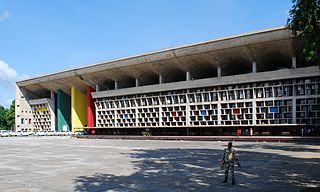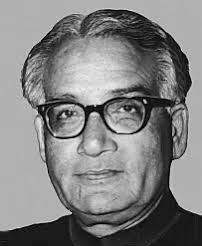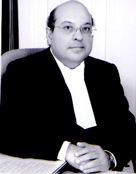
Adarsh Sein Anand was the 29th Chief Justice of India,serving from 10 October 1998 to 31 October 2001.

Capital punishment in India is a legal penalty for some crimes under the country's main substantive penal legislation,the Indian Penal Code,as well as other laws. Executions are carried out by hanging as the primary method of execution per Section 354(5) of the Criminal Code of Procedure,1973 is "Hanging by the neck until dead",and is imposed only in the 'rarest of cases'.

Punjab and Haryana High Court is the common High Court for the Indian states of Punjab and Haryana and the Union Territory of Chandigarh based in Chandigarh,India. Sanctioned strength of Judges of this High Court is 85 consisting of 64 Permanent Judges and 21 Additional Judges including Chief Justice. As of 14 September 2023,there are 58 Judges working in the High Court,comprising 36 Permanent and 22 Additional Judges.
The high courts of India are the highest courts of appellate jurisdiction in each state and union territory of India. However,a high court exercises its original civil and criminal jurisdiction only if the subordinate courts are not authorized by law to try such matters for lack of peculiar or territorial jurisdiction. High courts may also enjoy original jurisdiction in certain matters,if so designated,especially by the constitution,a state law or union law.

Yeshwant Vishnu Chandrachud was an Indian jurist who served as the 16th Chief Justice of India,serving from 22 February 1978 to the day he retired on 11 July 1985. Born in Pune in the Bombay Presidency,he was first appointed a Justice of the Supreme Court of India on 28 August 1972 and is the longest-serving Chief Justice in India's history at 7 years and 4 months. His nickname was Iron Hands after his well-regarded unwillingness to let anything slip past him.

Jagdish Sharan Verma was an Indian jurist who served as the 27th Chief Justice of India from 25 March 1997 to 18 January 1998. He was the chairman of the National Human Rights Commission from 1999 to 2003,and chairman of the Justice Verma Committee Report on Amendments to Criminal Law after the 2012 Delhi gang rape case. He remains one of India's most highly regarded Chief Justices and eminent jurists in its history.

Sarv Mittra Sikri was an Indian lawyer and judge who served as the 13th Chief Justice of India.
Ananga Kumar Patnaik is an Indian jurist and a former judge of the Supreme Court of India.
Swatanter Kumar is a retired justice of the Supreme Court of India and former chairperson of the National Green Tribunal. He is also former chief justice of Bombay High Court and judge of the Delhi High Court and the Punjab and Haryana High Court.

The National Green Tribunal Act,2010 is an Act of the Parliament of India which enables the creation of a special tribunal to handle the expeditious disposal of the cases pertaining to environmental issues. It draws inspiration from India's constitutional provision of Article 21 Protection of life and personal liberty,which assures the citizens of India the right to a healthy environment. This Act serves as a basis for the establishment of the National Green Tribunal (NGT).

Rohinton Fali Nariman is a former judge of the Supreme Court of India. Before being elevated as a judge,he practised as a senior counsel at the Supreme Court. He was appointed the Solicitor General of India on 23 July 2011. He also served as a member of the Bar Council of India. He was designated as a Senior Counsel by Chief Justice Manepalli Narayana Rao Venkatachaliah in 1993 at the early age of 37.

Jagdish Singh Khehar is a former senior advocate and a former judge,who served as the 44th Chief Justice of India in 2017. Khehar is the first chief justice from the Sikh community. He has been a judge in Supreme Court of India from 13 September 2011 to 27 August 2017 upon superannuation. He served for a brief period but gave many landmark judgements such as the Triple Talaq and the Right to Privacy verdict. He was succeeded by Justice Dipak Misra.

Ranjan Gogoi is an Indian former advocate and judge who served as the 46th Chief Justice of India from 2018 to 2019,having previously served as a Judge of the Supreme Court of India from 2012 to 2018. He is currently a Member of the Rajya Sabha,having been nominated by President Ram Nath Kovind on 16 March 2020. Gogoi served as a judge in the Gauhati High Court from 2001 to 2010,and then was transferred as a judge to the Punjab and Haryana High Court from 2010 to 2011 where he later was the Chief Justice from 2011 to 2012. He is also a member of the Committee on External Affairs in the Rajya Sabha.
The Indian Judicial Collegium system,where existing judges appoint judges to the nation's constitutional courts,has its genesis in,and continued basis resting on,three of its own judgments made by Supreme Court judges,which are collectively known as the Three Judges Cases.

The Indian High Courts Act 1861 was an act of the Parliament of the United Kingdom to authorize the Crown to create High Courts in the Indian colony. Queen Victoria created the High Courts in Calcutta,Madras,and Bombay by Letters Patent in 1862. These High Courts would become the precursors to the High Courts in the modern day India,Pakistan,and Bangladesh. The Act was passed after the First War of Independence of 1857 and consolidated the parallel legal systems of the Crown and the East India Company.
Arjan Kumar Sikri is an eminent jurist and a former judge of the Supreme Court of India. He was sworn in as a Supreme Court judge on 12 April 2013. Earlier,he had served as the chief justice of the Punjab and Haryana High Court. He retired as senior most puisne judge of Supreme Court of India on 6 March 2019.

Prafulla Chandra Pant is an Indian judge and author who served as a judge of the Supreme Court of India from 2014 to 2017. He later served as a member of the National Human Rights Commission of India from 2019 to 2021,and briefly acted as its chairperson. Prior to his appointment as a judge of the Supreme Court of India,he had previously served as chief justice of the Meghalaya High Court at Shillong and as a judge of the Uttarakhand High Court at Nainital.

Vinod Kumar Bali was an Indian jurist who was the Chairman of Central Administrative Tribunal,Principal Bench,New Delhi,and was the Chief Justice of Kerala High Court.
S. Muralidhar is an Indian Judge. He is former Chief Justice of Orissa High Court and Judge of the Punjab and Haryana High Court and Delhi High Court.

Ujjawal &Anr. versus State of Haryana&Ors.(2021),a case where Punjab and Haryana High Court,refused to provide police protection to a couple facing threat to their lives and personal liberty,citing potential disruption to "social fabric of the society."













